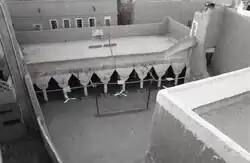Al-Ajnab
الأجناب | |
|---|---|
 Al-Ajnab, 1974 | |
| Coordinates: 24°37′54″N 46°42′52″E / 24.63167°N 46.71444°E | |
| Country | Saudi Arabia |
| City | Riyadh |
| Region | Old Riyadh |
| Language | |
| • Official | Arabic |
Al-Ajnab (Arabic: حلة الأجناب, lit. 'the foreigners' settlement') was a settlement and a douar within the city walls in the erstwhile fortress-city of Riyadh, Saudi Arabia, located in the northeastern corner of the walled town.[1][2] It was situated east of Masmak Fortress, at the entrance of Bab al-Thumairi. The ruins of the settlement today include most of Souq al-Suweigah in the ad-Dirah neighborhood and its name was derived from al-ājānib (Arabic: الأَجانِب), the Arabic word for outsiders as most of its residents where foreigners who were given accommodation as guests or advisors of King Abdulaziz ibn Saud,[3] such as John Philby and Muhammad Asad.[4][5]
The settlement shared close proximity with the Duhairah settlement from the east and al-Gadimah settlement[6][7] from the south and following the dismantling of the city walls and subsequent expansion and modernization of Riyadh in the 1970s, the settlement evolved into Souq al-Suweigah and assumed most of its current form during the Qasr Al-Hukm District Development Project between 1983 and 1992.
The settlement once hosted a garage that belonged to the future monarch of Saudi Arabia, Saud bin Abdulaziz and also hosted the residence of Princess Noura bint Abdul Rahman al-Saud, elder sister and adviser of King Abdulaziz ibn Saud and the eldest daughter of Abdul Rahman bin Faisal al-Saud, the last emir of the Second Saudi State.
References
- ↑ "تراث الرياض العمراني المفقود.. وما يمكن إنقاذه ! (1-2) - عبدالله بن محمد بن سليمان". www.al-jazirah.com. Retrieved 2023-08-26.
- ↑ "بيوت وقصور الرياض الطينية كنوز تراثية في طي النسيان". www.al-jazirah.com. Retrieved 2023-08-26.
- ↑ Sulaymān, Khālid ibn Aḥmad (1983). معجم مدينة الرياض (in Arabic). الجمعية العربية السعودية للثقافة والفنون، ادارة الثقافة،.
- ↑ "احياء الرياض القديمة - موسوعة". www.mosoah.com (in Arabic). 2021-05-25. Retrieved 2023-08-28.
- ↑ راغب, عبد الواحد محمد (1999). فجر الرياض : دراسة تاريخية (in Arabic). دارة الملك عبد العزيز. ISBN 978-9960-693-13-2.
- ↑ سليمان, رويشد، عبدالرحمن بن (1992). قصر الحكم في الرياض: أصالة الماضي و روعة الحاضر (in Arabic). s.n.]،.
- ↑ "مدينة الرياض تحتفي بالتاريخ والتنمية". www.alriyadh.com. 12 April 2012. Retrieved 28 August 2023.